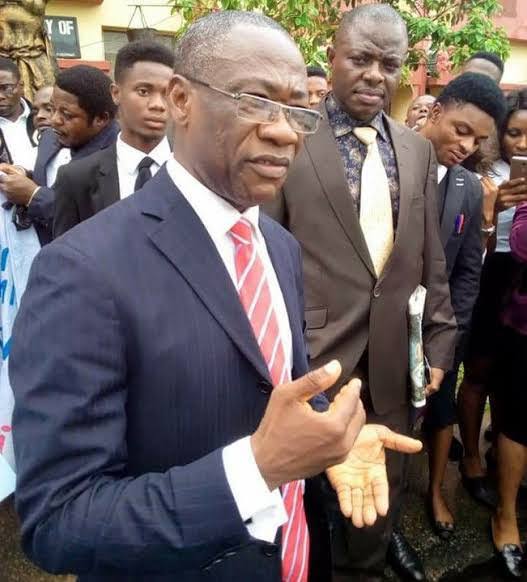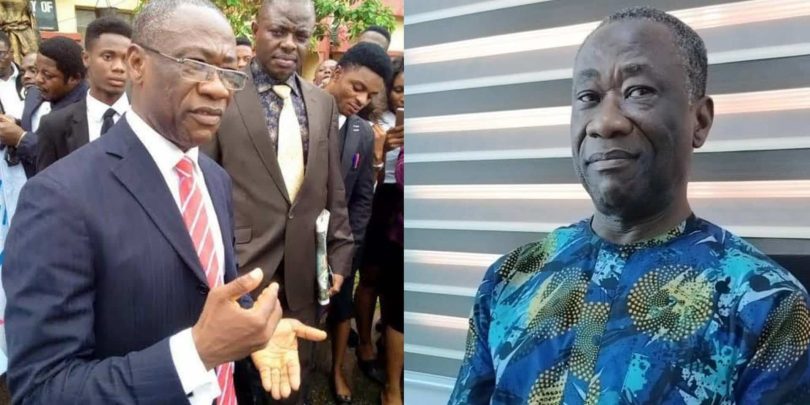The Federal High Court in Abuja on Monday, November 17, sentenced the suspended Dean of the Faculty of Law at the University of Calabar (UNICAL), Prof. Cyril Ndifon, to five years’ imprisonment without an option of fine for s3xual harassment.
Delivering the judgment, Justice James Omotosho ruled that the Independent Corrupt Practices and Other Related Offences Commission (ICPC) had successfully proved counts one and two against Ndifon beyond a reasonable doubt. The court handed him a two-year sentence on count one and five years on count two, with both terms to run concurrently.

Justice Omotosho, however, discharged and acquitted Sunny Anyanwu, initially a member of Ndifon’s legal team, of all allegations brought against him. The judge held that the ICPC failed to establish any connection between Anyanwu and the offences listed in counts three and four.
The ICPC had earlier filed a four-count amended charge dated January 19, 2024, naming Ndifon as the first defendant and his lawyer, Anyanwu, as the second. While Ndifon was originally the sole defendant, Anyanwu was later added after allegations emerged that he attempted to pervert the course of justice by calling and allegedly threatening the prosecution’s star witness during the trial.
Further details from the court proceedings revealed that Anyanwu, while serving as Prof. Ndifon’s lawyer, was alleged to have contacted the star witness, identified as TKJ, advising her not to honour ICPC invitations or provide any written statement regarding the sexual harassment allegations against his client.
In the amended charge, counts one and two specifically accused Ndifon of sexually harassing female students of the institution. The ICPC alleged that while serving as Dean of the Faculty of Law, he pressured a female Diploma student (TKJ) to send him “pornographic, indecent and obscene photographs” of herself via WhatsApp. He was also said to have repeatedly asked her to perform a sexual act (“blow job”) in exchange for assistance in securing admission into the Law programme.
Ndifon was further accused of leveraging his position as a public officer to sexually exploit several female students and obtain undue advantage over them.
“The victim was desirous of being admitted into the university, and the 1st defendant was in a position of advantage to help her, being the dean, and the diploma course is under his supervision.
“The instances of undue advantage are so much. The 1st defendant abused his office,” the judge said. He added that the court found Ndifon not to be a witness of truth.
“Consequently, the 1st defendant is hereby convicted of count one and count two,” the judge ruled,
While count three was directed solely at Anyanwu, both defendants were jointly charged in count four for allegedly attempting to pervert the course of justice.
The ICPC closed its case on February 14, 2024, after its fourth witness, forensic analyst Bwaigu Fungo, completed cross-examination. The defence team then filed a no-case submission, arguing that the prosecution had failed to substantiate its claims. However, on March 6, 2024, Justice James Omotosho dismissed the application and ordered the defendants to open their defence.
Ndifon testified as the first defence witness (DW1), while CSP Babagana Mingali, a forensic analyst with the Office of the National Security Adviser (ONSA), appeared as DW2.
In delivering judgment, Justice Omotosho held that the ICPC had successfully established all essential elements of the offences in counts one and two, adding that Ndifon failed to counter evidence showing he had exerted undue pressure on TKJ to engage in immoral acts.
Regarding count three, the judge noted that although Anyanwu had indeed called the witness, the call occurred about four months before the investigation officially began. He ruled that the court could not speculate on the lawyer’s intent at the time and therefore discharged and acquitted him of counts three and four.
Justice Omotosho, however, condemned Anyanwu’s unprofessional conduct in contacting a potential witness, and also described Ndifon’s actions as “immoral and unbecoming of a public officer.”

